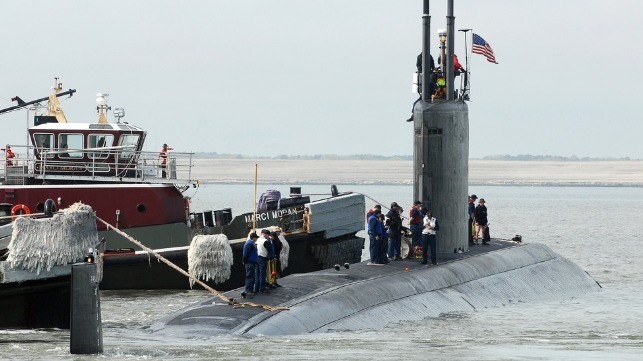U.S., UK Agree to Transfer Nuclear Sub Technology to Australia
New deal will strengthen military ties as competition with China heats up in the Indo-Pacific

The U.S. has announced a historic partnership with the UK and Australia to bolster military capabilities in the Indo-Pacific, starting with a program to transfer top-secret American nuclear submarine technology to Australia.
"This initiative is about making sure that each of us has a modern capability — the most modern capabilities we need — to maneuver and defend against rapidly evolving threats," said U.S. President Joe Biden in a press conference at the White House.
In a statement, the partners said that the objective of the defense agreement would be to "protect shared values and promote security and prosperity in the Indo-Pacific region," a clear reference to growing competition with China.
The new agreement is America's first official arrangement to share this top-secret technology with another country since the 1950s, when the U.S. began to provide its advances in nuclear submarine propulsion to the UK Royal Navy.
In an address on Wednesday, Australian Prime Minister Scott Morrison said that the new arrangement would be "a partnership where our technology, our scientists, our industry, our defense forces are all working together to deliver a safer and more secure [Indo-Pacific] region that ultimately benefits all."
"Our world is becoming more complex, especially here in our region, the Indo-Pacific," Morrison said. "To meet these challenges, to help deliver the security and stability our region needs, we must now take our partnership to a new level — a partnership that seeks to engage, not to exclude."
As a first step, the three nations will lay the groundwork for an Australian nuclear submarine program. The new subs will be built in Adelaide, Australia, with UK and U.S. technical assistance.
Morrison clarified that while these subs will be nuclear-powered, they will not be nuclear-armed. "Australia is not seeking to acquire nuclear weapons or establish a civil nuclear capability. And we will continue to meet all our nuclear non-proliferation obligations," he said.
The announcement marks the end of Australia's plans to spend $65 billion on 12 conventionally-powered submarines under a contract with France's Naval Group. The deal for these "regionally superior submarines" was signed in 2016, but it quickly ran into difficulties with costs and difficulties with local content requirements. In June, Australian Defence Secretary Greg Moriarty hinted that his department might be looking at other options."Of course you do reasonably prudent thinking about what one of those options might be or what you might be able to [do] if you are unable to proceed," he said in a parliamentary hearing.

that matters most
Get the latest maritime news delivered to your inbox daily.
The government of France reacted angrily to the announcement that Naval Group's contract would be replaced by a deal for American and British technology. "The American choice to exclude a European ally and partner such as France from a structuring partnership with Australia, at a time when we are facing unprecedented challenges in the Indo-Pacific region, whether in terms of our values or in terms of respect for multilateralism based on the rule of law, shows a lack of coherence that France can only note and regret," French Foreign Minister Jean-yves Le Drian and Armed Forces Minister Florence Parly said in a joint statement.
China's official response has been muted. In a brief remark, a spokesperson for China's embassy in Washington, D.C. told Reuters that certain nations "should not build exclusionary blocs targeting or harming the interests of third parties. In particular, they should shake off their cold war mentality and ideological prejudice."
